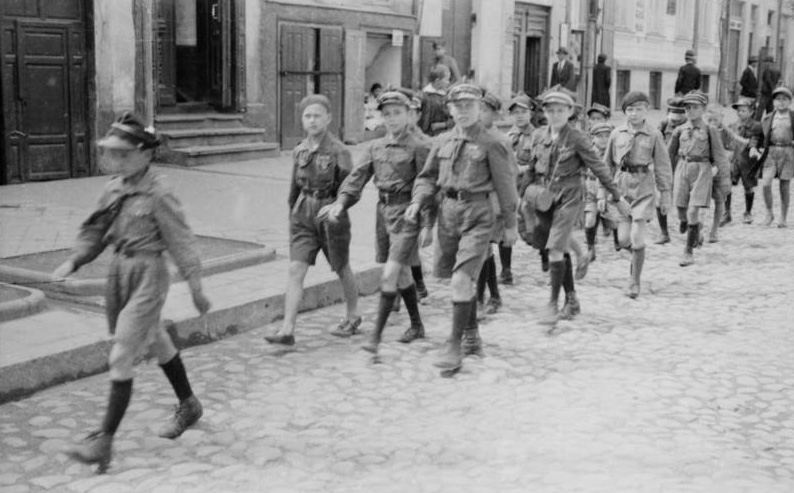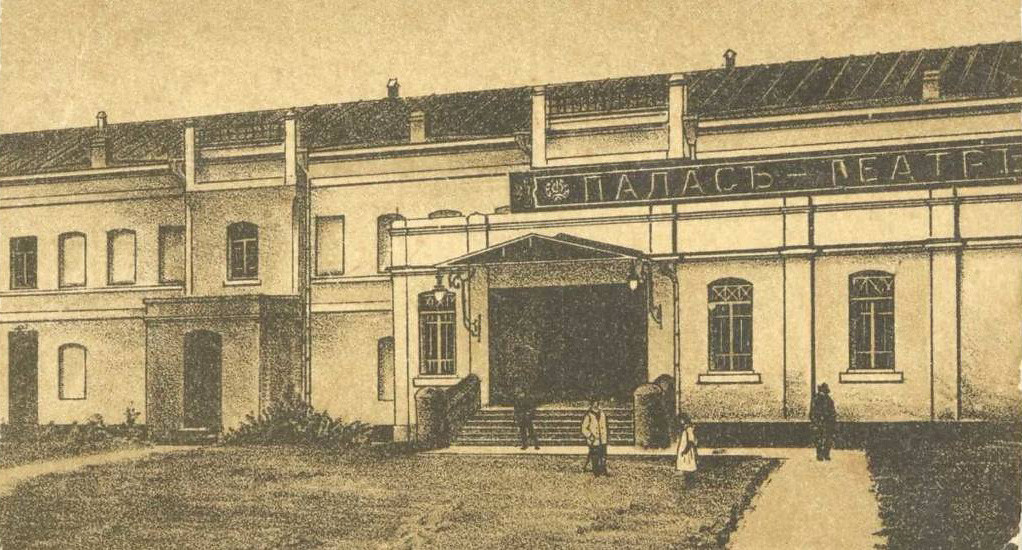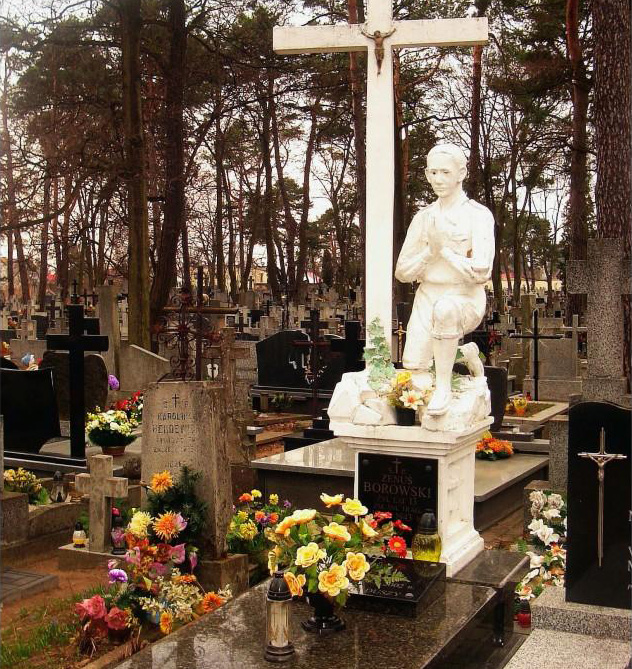Zenek Borowski: the story of a Polish kid killed for rescuing books during the WW2
In all the years that I have been learning things about Poland's past, something curious is already very common: to find touching stories that I feel are asking to be told.
A young scout in Nazi-occupied Poland
About the story that I bring you today I knew absolutely nothing. I met her last night on a channel about Polish history on Instagram. Except for that channel, which publishes its contents in English, I have only found sources in Polish, something common when talking about Poland. The protagonist of this story was called Zenuś Borowski (although his family and friends called him Zenek), and he was born on May 20, 1930 in Białystok, a Polish city located in the Podlachian Voivodeship, in the eastern part of the country. Zenek was 9 years old when Germans and Soviets invaded Poland.

The destruction of Polish culture by Nazis and Soviets
As I told you here, Hitler and Stalin felt great hatred towards Poland and set out to liquidate Polish culture. Schools, universities, bookstores, museums and theaters were closed in the two occupation zones, except those reserved for the Germans. The printing of books in Polish and the teaching of that language were also prohibited (imposing German and Russian, respectively). In both areas, books in Polish were destroyed and it was even forbidden to speak that language in public places. Therefore, the Polish resistance created the Tajna Organizacja Nauczycielska (Secret Education Organization), in order to create a clandestine educational system that would save the disappearance of the Polish language and culture.

Saving the Polish books that the Germans wanted to burn
Zenek's father was a photographer and belonged to Armia Krajowa (AK, National Army), the largest resistance organization created in a country occupied by the Germans during World War II, an organization that was loyal to the Polish Government in exile, based in London. In 1943 all of Poland had already been occupied by the Germans. In Białystok, as in the rest of the country, schools had been closed. In 1941 all the books of the city's libraries had been taken to the Teatr Palace, a movie theater on Kilińskiego Street, in order to burn them. "When we found out, we decided to go there and get as many books as possible," Jerzy Koszewski recalls, a neighbor and friend of Zenek (both lived in the same building at number 1 on Sobieskiego Street). "We felt a great need to read. There were no books at all at that time. And it was Zenek Borowski who organized these clandestine expeditions in search of books to save them from destruction," Jerzy recalls. We are talking about children who were willing to risk their lives to save books, because in them was the future of their language and culture. Is it possible to imagine this in today's world, where less and less is read?

A group of children who risked their lives visiting their Jewish friends
At that time Jerzy was 9 years old. His friend Zenek was 12 and belonged to the Scout movement, which during the World War II acquired enormous importance in Poland, because in its ranks the Szare Szeregi (Gray Ranks), one of the first organizations of the Polish resistance was created (it was formed on September 27, 1939, when the German-Soviet invasion of the country had not yet been completed). This group was made up of children and teenage scouts who collaborated with Armia Krajowa, generally doing propaganda tasks (for example, making graffiti), but also in sabotage missions and, already in the Warsaw Uprising of 1944, in combat missions. Zenek was the leader of his group of boys: "We felt respect for him and listened to him in everything," Jerzy recalls. The group sometimes met at the corner of Starobojarska and Sienkiewicz streets and sang songs, a way to keep their language alive (which is why the Polish resistance was musically very fruitful). They also infiltrated the ghetto to visit their Jewish friends, visits that also risked their lives.

The murder of Zenek during a book rescue action
Jerzy remembers that the Teatr Palace, where the books were stacked, was guarded by a Ukrainian soldier. The children managed to sneak into the theater from the back, on the side of the Biała River, entering the auditorium through a window. "The view was amazing. Thousands of volumes lay in a random mass, reaching the ceiling," Jerzy recalls. As children, Zenek and his band used to rescue Kornel Makuszyński, Janusz Meissner, James Oliver Curwood and Jack London youth novels. They hid the books under their clothes, inside the shirt, and left there trying to take as many books as they could hide without the sentry suspecting when they saw them. On April 17, 1943, Zenek and his friends returned home after rescuing books. It was getting dark, and on Kościelna street, near the theater, the sentry saw them and shouted "Stop!". Zenek shouted to his friends: "Let's run! They can shoot us." The boy started running towards the Biała river when the sentry shot him in the back. The shot hit Zenek in the head. The boy fell dead to the river. German military police took the children to Warszawska Street, where they were interrogated. Then they were released, returning home very scared.

A child remembered as the little hero of Białystok
Someone secretly rescued the child's body and deposited it in the morgue of Ogrodowa Street. There he was found by Zenek's mother. The boy's father had been arrested by the Gestapo, the German secret police, so he could not attend his son's funeral. Jerzy remembers that the soldier who shot Zenek came, regretfully, to apologize to the boy's mother for what he had done. When he was released, Zenek's father placed a monument on his son's grave, with a small white statue of a scout kneeling before a cross, praying. There it continues, in the Cmentarz Farny (Parish Cemetery) of Białystok, and on his tombstone people continue to deposit flowers, because today in that city and in Poland they remember Zenek as what he was: a little hero. The Teatr Palace was set on fire by the Germans along with the books it contained in 1944, but the inhabitants of Białystok managed to save a part of them before that happened. In this video (in Polish, subtitled in English) we can see his friend Jerzy, and an old man, remembering Zenek and his murder in the place where it happened:
A year ago, the Polish rapper Cira published this theme entitled "Zenek", dedicated to the little hero of Białystok, with a reenactment of the exploits of that group of children trying to save books from destruction:
From Spain, I dedicate this post to Zenek and that group of children who risked their lives to support their Jewish friends and to save the culture of their country.
Cześć i chwała bohaterom!
Honor and glory to the heroes!
---
Bibliography:
- "Zenek Borowski", in Pamiętaj Skąd Jesteś.
- "Zenek Borowski zginął za książki", by Alicja Zielińska in Kurier Poranny.
- "Zenuś Borowski", by Białystok według Ani.
- "Renaissance, Palace i garaże samochodowe", in Kurier Poranny.
|
Don't miss the news and content that interest you. Receive the free daily newsletter in your email: Click here to subscribe |
- Most read
- The 'hole' without civil flights around Paris during the opening of the Olympic Games
- Spain vetoes the Russian frigate 'Shtandart', which intended to reach Vigo, in all its ports
- The interior of the Statue of Liberty torch and the sabotage that canceled its visits
- The ten oldest national flags in the world that are still in use today
- The BNG boasts of the support of a terrorist group and a dictatorship at a public event
- The Russian intelligence document that sparked a hoax about French troops
- A virtual tour of ancient Rome in full color, just as it was in its heyday

 ES
ES





Opina sobre esta entrada: